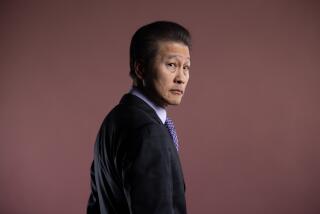1995-96: REVIEW AND OUTLOOK : Banker Ng: A Star on the Rise : Finance: President of East-West Bank has first-hand understanding of uncertainty driving capital out of Hong Kong and Taiwan.
- Share via
Dominic Ng, whose profile is rising fast in Southern California’s Asian American business community, doesn’t have to look far to gauge the high price of political uncertainty.
His parents were among the 1 million Chinese who fled to Hong Kong when Communists wrested control of China in 1949. Four decades later, they left Hong Kong for Los Angeles after the British agreed to return the colony to China in 1997.
Two other siblings have joined Ng (pronounced Eng) and his parents here, one within the last year.
Ng, who came to the United States in 1977 to study accounting, feels the ebb and flow of Chinese politics in the most personal of ways.
But as the president and chief executive of East-West Bank in San Marino, the nation’s largest Chinese community bank, Ng also recognizes the financial opportunities for those smart enough to forecast which way the winds are blowing.
That was vividly illustrated last summer when a round of missile tests by the Chinese government sparked jitters in Taiwan, China’s longtime political enemy. In a matter of months, wealthy Taiwan residents had moved billions of dollars out of the country, much of it to Chinese community banks in Southern California.
“There are always going to be some ups and downs” in these relationships, said the 36-year-old executive. “Our bank needs to be ready to react to it.”
Ng is banking on that stream of capital continuing in the coming year, given the political instability and growing wealth within the Hong Kong-Taiwan-China triangle. Although Hong Kong’s richest have already stashed their wealth abroad, he expects more mid-level professionals, particularly those with children, to leave as the deadline for the Chinese takeover nears.
That means new customers for the East-West Bank, which is seeking to position itself as a financial institution serving an increasingly prosperous Chinese diaspora stretching from Hong Kong and Taiwan to Southeast Asia and the West Coast of the United States.
But competition for those dollars is increasingly fierce, particularly in Southern California, where several dozen Chinese community financial institutions have been joined by foreign banks and mainstream commercial institutions eyeing the now-prosperous ethnic communities.
The Chinese weren’t always in such demand. East-West Federal Bank was founded in Los Angeles in 1972 as the first federally chartered savings and loan intended for the Chinese community. A major impetus was to provide home loans for Chinese immigrants who could not obtain them from mainstream banks, because of discrimination or for other reasons.
Back then, according to Ng, East-West was unusual in its willingness to give loans to people based on work record and character rather than net worth.
“In general, banks are not comfortable or familiar with first-generation immigrants,” he said. “The only ones who dared to do that were the Chinese American banks. We [East-West Bank] feel comfortable giving loans to the waiters, busboys and grocery store owners who’ve been in the Chinatown community for many years.”
East-West expanded alongside the Chinese community, fed by a burst of new immigrants from Taiwan and Hong Kong in the 1970s and ‘80s. In the late ‘80s, Sjamsul Nursalim, the head of Gadjah Tunggal Group, one of Indonesia’s most powerful conglomerates, began looking overseas to expand a financial network that included BDNI, Indonesia’s third-largest bank.
Nursalim bought Los Angeles-based United Pacific Bank in 1989, and two years later purchased East-West, which had moved its headquarters to San Marino to better serve the San Gabriel Valley’s fast-growing Chinese community. The new Indonesian owner also persuaded Ng, who oversaw the China practice for the Deloitte & Touche accounting firm, to take over the bank.
Under Ng’s direction, East-West has grown rapidly, doubling its assets to more than $1.3 billion and expanding its branch network as far north as San Francisco. Earlier this year, the savings and loan gained commercial bank status, which allows it to offer loans and other services important to Asian investors and U.S. companies expanding abroad. It is now known as East-West Bank.
As chairman of the National Assn. of Chinese American Bankers and co-founder of a political advocacy group called Chinese Americans United for Self Empowerment, or CAUSE, Ng is also helping raise the visibility of Chinese Americans inside and outside politics.
It’s the fundamentals of community banking--personal attention, well-placed contacts and an intimate understanding of the economy on both sides of the Pacific Ocean--that set East-West Bank apart from its much bigger mainstream competitors, Ng believes.
East-West’s Chinese community may now stretch from Hong Kong and Taipei to Monterey Park, but, Ng said, his best information is still gathered in much the same way it was when the Chinese American community was concentrated in a few blocks of downtown Los Angeles.
He works the telephones, talks to his customers and attends the weekly banquets, fund-raisers and community celebrations where news is shared long before it makes headlines or the evening news.
Said Daniel Fong, a leading businessman and chairman of CAUSE: Ng “is very, very visible in the Chinese community.”
More to Read
Sign up for Essential California
The most important California stories and recommendations in your inbox every morning.
You may occasionally receive promotional content from the Los Angeles Times.













